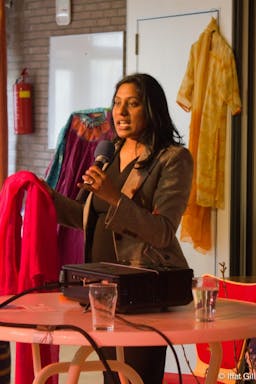Pakistan: The role local library can play in digital empowerment of women
Jan 21, 2015
Story
One of the many ways in which we are trying to empower women is through the use of the infrastructure available in libraries. A great idea and using already existing facilities will make it possible to reach many more women. But is this true? My work in Layyah in Pakistan allowed me to take a look at the practical side of this seemingly simple idea.
Layyah is a small city in Pakistan. Of the 500,000 residents, most have their roots in nearby villages, coming to the city for work. Layyah shares its modest facilities with around 1000 villages nearby and has one library. The library is a one room building, run by the municipal community, with a collection of around 3000 books. The library is mostly frequented by males who come here to read the daily papers. Since it is small, the sitting places are outside, on the veranda.
When asked whether women visited the library, the librarian answered with a question; “Why would women go to a place where there is no option of pardah?” (pardah means seperation of men and women, women should be covered or in seperate rooms from men). Women are traditionally not encouraged to leave the house unless necessary. Women go to the fields or other places to work, they might visit relatives and girls can go to school. But to go to places like the local library is unheard of, it’s not done.
Sixty percent of Pakistan’s population lives in rural areas. In more remote and rural parts, women have to observe pardah. A lot of places have separate sections for women, euphemistically called “family area”. Since women are not encouraged to go to places where there is no option for segregation, it discourages them from taking advantage of a lot of opportunities that might be made available to the public. Much like our small library. The library has the potential to be a source for access to information, but due to social and cultural barriers, it is out of bounds for women.
If we want to use libraries to help empower women through access to information we first need to make sure that we have a building, a libarian and books. Then we need connectivity and equipment to enable access e.g. computers, photocopier, printer etc. But even if we arrange all that, it will only go to waste if we do not also address the problems for women to actually get into the place. If those changes are made, this public facility can serve more populations in a much more effective way. Libraries are also a good place for Internet access, because they do not have the negative connotations that cybercafes and telecenters have.
There is a need for providing an enabling environment for women to have access. This means that there must be trained female staff to assist female visitors to the library. To solve the issue of segregation, women can get, for instance, special time slots to visit the library.
Most importantly, the library needs to be welcoming so that women feel secure to visit. This could be achieved by hosting women related seminars or events e.g. by local health services or host computer trainings specifically for women. Trainings, specifically trainings exclusively for women would address the issue that women might otherwise not be allowed to leave the house and come to the library. With the current economic situation, more and more people are becoming aware of the importance of learning new skills and having digital literacy skills. The local (district) governments are generally open to development projects in the region and welcome new partnerships that can help them update the current services.
Even though there are many hurdles to overcome before this valuable resource, the local library, becomes suitable to serve its purpose, this currently underused facility has a great potential to become a valuable asset and tool for women empowerment and access to ICTs and information.




